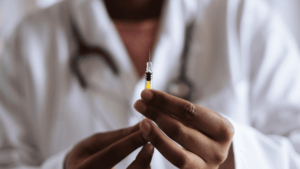Scientists used a combination to obtain a significantly stronger immune response against disease
Share this article
Researchers at the Massachusetts Institute of Technology (MIT) have developed a way to improve the protection provided by vaccines single dose against the HIV. The news, however, can help create new immunizers for other diseases.
In the latest work, scientists have combined two adjuvants, substances added to a product to improve its effectiveness or performance, to obtain a significantly stronger immune response. The results were described in a study published in the magazine Science Translational Medicine.
Vaccination is critical to avoid increasing infections
- Worldwide, HIV has already caused 42 million deaths.
- It is estimated that this is almost the same number of people living with the disease today.
- Most of them are in Africa, almost 65%.
- In Brazil, 46,495 new cases were recorded in 2023.
- This represents an increase of 4.5% over the previous year and follows a global trend of elevation in infections.
- According to experts, the best way to prevent new cases is to reinforce vaccination against the disease.
read more
Increase in the number of antibodies was observed
In the new work, the MIT team combined two adjuvants to get a significantly better immune response than a vaccine with just one of them. The immunizer was tested on mice and presented great results.
The adjuvants in question are aluminum hydroxide, which is commonly used in immunizers, and a nanoparticle called SMNP, developed by researchers. It contains saponin, an adjuvant derived from the Chilean soap bark tree, and a synthetic adjuvant called monophospharile lipid A (MPLA).
According to scientists, this combination increased the response of B cells two to three times. They are responsible for producing antibodies that can recognize a pathogen to which the body was exposed earlier, increasing the chances of combating dangerous viruses.
The new approach caused the double adjuvant vaccine to accumulate in the mice lymph nodes and stay there for a month, during which their immunological systems effectively developed many antibodies against HIV protein. This same technique can be used to combat other viruses, such as Influenza and even Covid-19.
Collaboration for the digital look
Alessandro Di Lorenzo has a degree in Journalism from the Federal University of Rio Grande do Sul (UFRGS) and has been working in the area since 2014. He worked on BandNews FM newsrooms in Porto Alegre and São Paulo.
Lucas Soares is a journalist graduated from Mackenzie Presbyterian University and is currently editor of science and digital look space.











